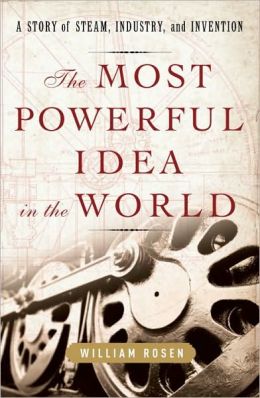I just finished reading the second chapter of The Most Powerful Idea in the World: A Story of Steam, Industry, and Invention by William Rosen. In the chapter Rosen traced the idea of steam power up to the first really successful commercial steam powered pumps -- the Newcomen steam engine.
He suggests that Leonardo da Vinci, a great inventor by anyone's standards, probably visualized his inventions, as did the architects who built the cathedrals and many other early inventors. In the case of Leonardo his invention was probably based on his artistic training and also involved his trained ability to represent what he saw in his mind's eye with his hands by drawing or painting.
Rosen seems not to recognize that artists and sculptors often develop their original ideas through drawings or through small sculptures. Models were common in naval architecture and I believe also in monumental architecture, as they are in architecture today.
I have talked to a sculptor who told me that he would look at a piece of wood and see what was hidden within it. His work was simply to slice away the material that hid the sculpture from others. Indeed, I was asked at one point when he delivered a commissioned work whether I could see the figures adequately, or whether he should clear away more. I have talked to a painter who told me that he would look at a canvas until he saw the painting and if he liked it he would apply paint; if he didn't like it he would have to put the canvas away since the image would remain in his perception even thought the canvas was unpainted.
In the case of Newcomen, he was able to work metal with his hands in the days when that was done by blacksmiths, the days before metal working machinery. He knew of an earlier steam engine and worked for years to extend the basic concept to something far more useful and commercial. The Newcomen steam engine involved many innovations which together made his steam engine more rugged, safer and more efficient than its predecessor. Rosen suggests that Newcomen's inventiveness was as much in his ability to imagine what a part would feel like in his hands as in his ability to imagine what the engine would look like when he could see it with his eyes.
 |
| Illustration of the Newcomen atmospheric engine for pumping water. |
I know that the things I invented were based on intuition that something could be invented and intuition as to how it could be done. That intuition is not consciously constructed, but I suspect comes out of the brain, raising to consciousness. The way it presents itself to consciousness probably depends on how a person's consciousness functions -- people who think in pictures see images of innovations, people who think in words tell themselves of innovations. Indeed, if Leonardo's brain and body had learned to make images and Michelangelo's tomake sculptures, the unconscious processes might well have occupied nervous pathways established and strengthened by their learned trades.
Can children learn to be inventors? I suspect that few will turn out to be Leonardos or Einsteins, but that all kids can learn to find ways to build on the inventions of others with their own innovative improvements. Indeed, I am pretty sure that all inventors do that.
I recently posted on a framework for learning being developed by a lot of smart people. But I am not sure that they recognized that schools should help kids to learn to develop their own imaginations, and that this would depend fundamentally on the way each kid's brain, nervous system, and consciousness worked. I think schools should help kids learn to invent, and that a framework for learning would include the many ways people can invent.

No comments:
Post a Comment